




















Introducing a revolutionary tool for modern healthcare: Digital Growth Charts

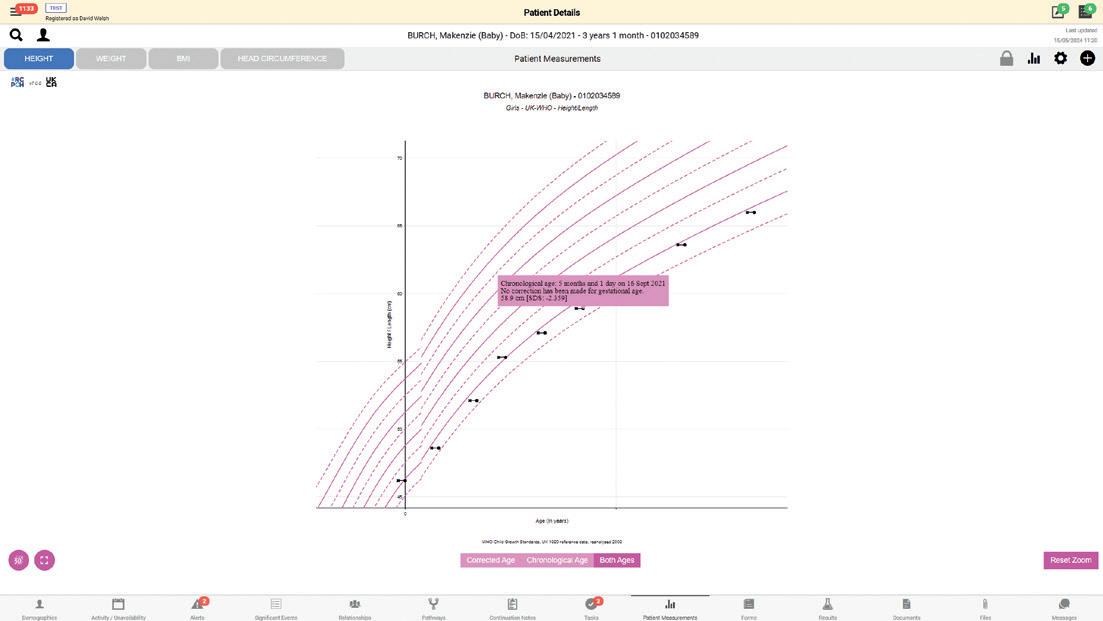
Developed by a multi-disciplinary group of experts, from clinical paediatrics, nutrition, health informatics and statistics – the RCPCH Digital Growth Charts automate calculations of children’s height, weight, head circumference and BMI using UK-WHO standard growth data and include specialist charts for Down’s and Turner’s Syndromes.
MHRA-accredited as a medical device, RCPCH’s Digital Growth Charts provides highly accurate and consistent growth calculations to every clinician at the point of care, reduces the risk of errors, saves clinical time, and improves patient care.
The Digital Growth Charts technology has already been integrated into patient platforms and portals in NHS Trusts across England, Wales and Scotland.
“This is an exciting and valuable addition to our work. It allows us to see measurements taken in all different locations, providing a joined-up service with other health professionals.”
Sabine Grosser, Consultant Paediatrician at NHS Forth Valley

“Cambric was asked to provide growth charting capabilities within our Morse community EPR platform. We reviewed the market for existing tools and solutions and concluded that the RCPCH Growth Chart API was the most capable solution to match (and exceed) the needs of the Morse user base.
The RCPCH team are the subject matter experts and have created the gold standard for digital child growth calculation and charting via their API. Integrating the API with the Morse EPR was fast and painless thanks to the excellent technical and clinical support provided by the RCPCH team to our developers and, of course, our clinical stakeholders.”
David Welsh, Product champion at Cambric Systems
Integrate the RCPCH-approved Digital Growth Chart technology in to your place of work today and start enjoying the benefits.
Email us at growth.digital@rcpch.ac.uk to get started.





to the autumn edition of Milestones
It might seem odd, as you snuggle down with your slippers and pumpkin latte, that I’m telling you this issue is all about growth. Surely that would be better suited to the spring edition? But if medicine has taught us anything, it’s that we are constantly learning and evolving, no matter the season. Sometimes this is good, healthy growth, but sometimes that growth can be jeopardised, particularly if we don’t have the support to sustain it.
How do we ensure that we meet GAPRUKI’s call to be more research-active (page 18), that we do #AskAboutAsthma (page 11) and that we incorporate CoLab’s inspiring frameworks to support medically complex CYP and families into our practice (page 12)?
The centrepiece of this edition is Thrive Paediatrics (page 24) and the wider College work that lies behind it: recommendations, toolkits and real-life stories of how prioritising what gives them roots has enabled paediatricians to flourish and meet the ever-growing needs of our patients and families.
Enjoy this edition of Milestones
Dr James Dearden
Paediatric Consultant
@drjamesdearden



















CoLab Partnership
CYP with complex medical needs
the Guideline Development Hub
children's health through play
Mitigating the impact of air pollution 22 My journey Going part-time in the NHS
23 Using your voice
Driving change in Northern Ireland 24 Thrive Paediatrics
Protecting your wellbeing with Thrive Paediatrics
The latest from the President, news, diary dates and more 9 RCPCH &Us CYP on managing transition
Including reviews and a tasty pastry recipe
in
life Consultant in children’s palliative medicine Dr Ella Aidoo
Copyright of the Royal College of Paediatrics and Child Health. All rights reserved; no part of this publication may be reproduced, stored in a retrieval system, or transmitted in any form by any means – electronic, mechanical, photocopying, recording, or otherwise – without prior permission of the publishers. The views, opinions and policies expressed in Milestones do not necessarily reflect those of the College. While all reasonable efforts have been made to ensure the accuracy of the contents of this publication, no responsibility can be accepted for any error, inconsistency or omission. Products and services advertised in Milestones are also not recommended or endorsed by the College. Readers should exercise their own discretion and, where necessary, obtain appropriate independent advice about their suitability. Royal College of Paediatrics and Child Health is a registered charity in England and Wales (1057744) and in Scotland (SC038299). Registered address: 5-11 Theobalds Road, Holborn, London WC1X 8SH. Design Manager: Christina Richmond Senior Editor: Lizzie Hufton Publisher: James Houston. Milestones is published four times per year on behalf of the Royal College of Paediatrics and Child Health by James Pembroke Media, 90 Walcot Street, Bath, BA1 5BG. T: 01225 337777. Advertising:


Professor Steve Turner RCPCH President
HELLO, NICE TO be in touch with you once again.
In addition to the quarterly editions of Milestones, our patients remind us of the often rapid passage of time. Last week a (very young) mum of a wheezy four year old asked if I remembered that I used to look after her asthma when she was a child. In the same clinic, I discharged a robust 16 year old, wearing a leather jacket and gold chain, who I’d first met as a scrawny 18 month old.
What has been happening at the College since the summer edition? I won’t go into chapter and verse, the website is there for the

Simon Broughton RCPCH Officer for Medical Recruitment
intrepid reader, but here are a few headlines:
The membership survey results came out in June and with almost three-quarters of respondents saying they’re proud to be members, we’re working hard to increase this proportion by continuing to improve our o er. Some suggestions made by members in the survey are already available, eg concessions, e-learning and workforce planning. Therefore it’s clear we need to highlight what’s already available as well as develop new resources.
We have new o cers. I’m delighted to congratulate Dr Bhanu Williams on her appointment as our new Assistant Registrar. Also, I’m pleased to welcome our two International O cers – Deepak Ugra (Mumbai) and Furrukh Jamil (Riyadh).
I AM SO proud to be involved in #ChoosePaediatrics, advocating for and enthusing medical students and foundation doctors interested in paediatrics as a career.
#ChoosePaediatrics depends on many people at RCPCH and clinicians delivering resources and opportunities for all. Winning the prestigious national Memcom Excellence Award for Best Membership or Recruitment Strategy was a testament to the enthusiasm and impact we’ve had on recruitment into our wonderful specialty. We focus on medical students, foundation doctors and paediatric trainees at ST1 – the early stage of their career in paediatrics – and give them the information and resources to enable them to make the best career choices for themselves.
The #ChoosePaediatrics monthly bulletins are a great resource that aspiring paediatricians can subscribe to, having signed up for the free RCPCH Medical Student and Foundation Doctor membership. Many senior paediatricians help deliver the #ChoosePaediatrics message at conferences,
Find your pull-out poster on page 16
I believe we’re the first College to have International O cers on the council. We’ve almost completed a body of work that will highlight College roles and their benefits to members – more about that later this year.
Progress+. By the time you read this, the first anniversary of Progress+ will have passed. Many thanks to everyone for making the transition so smooth.
The new UK Government has come in with a vision of raising the healthiest generation of children ever and we will support this across the UK. The solutions have been known for a long time, so the challenge is not the ‘what’. It’s going to be the ‘how’ that will be di cult – for the Government to find additional resources and for us to change some of our practice. More on this when I’m next in touch with you.

career events and during their daily work, often in their own time. It’s so important to make ourselves available to enthuse the next generation. This is not just a task for RCPCH and clinicians attached to the recruitment, workforce and careers teams, it is every paediatrician’s role. We need to tell our stories – about why we love paediatrics, our career journeys and our role models. Please put up the #ChoosePaediatrics poster in your departments. For more information, visit www.rcpch.ac.uk/ education-careers/choose-paediatrics or email choosepaediatrics@rcpch.ac.uk

Nick Brown Archives of Disease in Childhood Editor-in-Chief
@ADC_BMJ
LATE SUMMER, as we all know, is characterised by subtle but unignorable changes: the small but consistent drops in temperature; the change from t-shirt to t-shirt and light sweater; a slightly sweeter smell to the air; the earlier nightfall; and, for many, a change in mood.
For those of you who find this transition difficult, there are consolations.
The content in ADC has – thanks to the associate editors – recently been of such high quality, variety and depth that one quick antidote is to simply look at recent months and (without spilling more beans than I should) some upcoming respiratory highlights: alternative disease activity measurement in cystic fibrosis; hypothesis generation – autonomic origins of asthma; and WHO guideline policy changing systematic review series on acute asthma management.
In paediatric emergency medicine, the respiratory theme continues: asthma discharge advice and guidance and – from a PICU viewpoint – extubation
safety in status epilepticus in nontertiary settings.
I will soon be recording a short video series on reviewing papers on the RCPCH site to help trainees get their feet on this rung of the research ladder – several of you have already expressed an interest.
Despite autumn approaching, the sun’s breaking through now, revealing a blue sky behind the gentle, cotton-like clouds. It’s time to jump on the bike, head for the lakes with trunks (optimistically) in hand and the consoling thought that, however fast the temperatures drop, it won’t be long before the ski slopes reopen – not a bad alternative.




Shanti Raman
BMJ Paediatrics Open Editor-inChief
@BMJ_PO
BMJ PAEDIATRICS
OPEN has strived to publish interesting papers on paediatrics and child health throughout 2024. Our ‘Health and Wellbeing of Street and Working Children’ topic collection call has drawn to a close, and we will soon make available on the website a truly challenging and thought-provoking set of articles.
The call for submissions for ‘Preventing and Mitigating the Impact of the Climate Crisis on Child Health’ will continue for three months.
The next topic collection, ‘Disability and Development in Early Childhood’, has just been announced and submissions are now welcome via the collection page.
Recent papers that have caught my attention, and will certainly influence practice include:
Physical health complications in children and young people with avoidant restrictive food intake disorder (ARFID): a systematic review and meta-analysis
Rachel Marie James, Jonathan O’Shea, Nadia Micali et al. bmjpaedsopen.bmj.com/ content/8/1/e002595
This is the first comprehensive review of Avoidant Restrictive Food Intake Disorder (ARFID), which is a feeding and eating disorder, often resulting in malnutrition and its consequent physical health complications in children and young people (CYP). The review found that CYP with ARFID can present across the whole weight spectrum; ARFID is not exclusively a low-weight eating disorder. CYP with ARFID are at risk of several other complications, such as low bone mineral density and nutritional deficiencies, which do not discriminate based on the individual’s weight.
Themes associated with uncollected paediatric prescriptions at a large tertiary children’s hospital: a retrospective,
observational study
Chloe Elizabeth Charlotte Williams, Louise Bracken, Andrea Gill et al. bmjpaedsopen.bmj.com/ content/8/1/e002366
Authors of this study found that both high-risk and low-risk medications may not be collected by caregivers, for reasons that are currently unclear. However, a high proportion of these children are living in the lowest deciles of deprivation and therefore socioeconomic circumstances may be an important theme when accessing medication.
We are committed to showcasing research and policy, particularly from young, emerging professionals and from the majority world. We are also very keen to bring out the voices and lived experiences of CYP in the ‘Young Voices’ section – so if you have anything to do with mentoring young people, we want to hear from you.
Don’t forget, we offer waivers for the full Article Processing Charge (APC) for authors based in low-income countries, and a 25% discount for RCPCH members.

Bruce Warwick Public Affairs and Campaigns Manager @bruce_warwick
I JOINED THE COLLEGE in October 2021 as public affairs and campaigns manager. I arrived here from Westminster where I’d been working for an MP, which gives a clue to my role. I’m responsible for ensuring RCPCH is seen as an authority on child health matters by the Government, MPs, peers and civil servants.
In practice, this requires a good understanding of the political environment and an ability to provide
strategic advice to the President and senior officers accounting for the College’s mission and priorities.
One day I might be writing a briefing for an MP ahead of a debate on a piece of legislation, the next I might be supporting our President ahead of a ministerial meeting or discussing a joint campaign with children’s charities.
I’m not sure where you’re more likely to get lost – in the labyrinthine Palace of Westminster, or the complex NHS system, but, since joining RCPCH, what’s certainly helped with the latter – to an extent
Paediatricians concerned by yet another annual
NHS DIGITAL has published its annual Childhood Vaccination Coverage Statistics for England (2023-24). The latest data shows that:
vaccination coverage decreased in 2023-24 coverage decreased for all of the 14 vaccine coverage measures reported in 2023-24 decreases were between 0.1 and 1.0 percentage points compared to the previous year
16.1% of children who turned five between 1 April 2023 and 31 March 2024 had not received both doses of the MMR vaccine one in nine children (11.1%) who had their second birthday in 2023-24 did not get the first dose of the MMR vaccine one in 12 babies (8.8%) had not received all three doses of the 6-in-1 vaccine, which includes protection against whooping cough and other serious diseases such as diphtheria and polio, by the age of one.
RCPCH Officer for Health Services, Dr Helen Stewart, said: “As evidenced by NHS data, we have seen a steady decline in vaccination coverage for children over the past 10 years. We now find ourselves in a situation where the UK does not meet the World Health Organization’s target of 95% coverage for any routine childhood immunisations.
“The result of this trend is being felt already, with measles outbreaks occurring across the UK, increasing cases of whooping cough, and poliovirus being found in sewage samples in London. When investigating NHS services, the recently published Darzi Review noted the impact declining vaccine uptake is having on our children and called for urgent action.
“We understand that vaccine hesitancy may be an issue in some instances, but evidence shows that accessibility and availability of health appointments plays a huge role in low
– is that before my stint in parliament I had been working in health.
At Diabetes UK I was part of a campaign to ensure access to Type 1 teaching. Before that, I was fortunate to be able to travel while persuading the Government of the benefits of using overseas aid on global health, specifically TB/HIV co-infection.
I knew I enjoyed influencing on health, but it was the opportunity to work closely with paediatricians that I was particularly excited about when I took this role. It’s hugely satisfying to marry my political insight with the expertise of College members – with each perspective throwing up a potential opportunity to campaign for change.
For a political geek like me, my role at RCPCH in helping to secure policy change to improve child health and support members is hugely rewarding.

uptake. We urge the UK Government to take forward the commitments of the NHS’s vaccine strategy and work towards reversing this dangerous trend.”
RCPCH has established a multidisciplinary commission to review what can be done to increase and sustain immunisation rates of children to the level that is needed. We are focusing on the UK, but hope our learning can be applied globally.
For more information, visit www.rcpch.ac.uk/resources/ commission-vaccine-uptakeaccess-equity
A generational change in Westminster – but what does it all mean for child health and wellbeing?




Dr Andrew Rowland Consultant Paediatrician
RCPCH Officer for Child Protection Manchester Foundation Trust
THE RECENT UK general election was a political earthquake. It may not have felt like it given multiple polls pointing to the eventual outcome, but there is no doubt the political landscape has dramatically changed. Labour is in power after 14 years; the Liberal Democrats have their highest number of MPs ever and the Conservatives their lowest. Both the Greens and Reform increased their presence on the green benches.
Although the timing of the general election came as a surprise, RCPCH was prepared. We launched our general election manifesto a year ago, which challenged political parties to support, promote and improve children’s health and wellbeing in a changing world. Over subsequent months, we’ve shared the recommendations within this manifesto with writing teams, politicians and candidates.
Party manifestos, published ahead of the general election, set out what the political parties would do if elected. The College’s influence, as part of wider calls from across the health and children’s sector for politicians to address child health and wellbeing more e ectively, is evident in several policies across the three main parties’ manifestos.
The dust has now settled and the new Government has set out its legislative programme for the year, but what does it all mean for child health and wellbeing?
Consistent with its manifesto, in the King’s Speech the Labour Government set out plans on the prevention of ill health and mental health. In the next year, it will legislate to restrict both junk food advertising and the sale of ener drinks, vapes and cigarettes. It is positive that the

Secretary of State for Health and Social Care has pledged to prioritise public health and prevention, and the College will be sure to hold the Government to this.
RCPCH is acutely aware that in addition to a more ambitious drive on the prevention of ill health, we need to act on the challenges faced by existing child health services and paediatricians. In response to Lord Darzi’s investigation into the state of the NHS, the Prime Minister Sir Keir Starmer pledged to carry out the “biggest reimagining of our NHS since its birth”. The College’s blueprint for child health services sets a clear roadmap for getting children’s services back on track, including through better support for the workforce, and we’ve sought to use this as the basis for conversations.
Elsewhere, the announced Children’s Wellbeing Bill provides an exciting opportunity to secure some of the College’s key recommendations on child protection and safeguarding in law. This includes taking forward our work on protecting children from physical punishment and following Scotland in incorporating the United Nations Convention on the Rights of the Child (UNCRC) into domestic law.
Thinking about children holistically remains at our core and for these reasons we have engaged with the Government’s child poverty taskforce and look forward to seeing how this develops. The College remains clear that at the heart of this needs to be the removal of the two-child limit on benefits and we’re working closely with anti-child poverty organisations to make this case.
Post-election, our task is not just to engage with Government but also with new MPs across the House to ensure child health and wellbeing remains on the agenda. I’d encourage you to reach out to your MP to ask how they’ll prioritise the needs of children and your needs working as a paediatrician. Why not set aside a few minutes of your time over the coming week to drop your MP an email or a letter and ask them about their commitment to child health and wellbeing, and our paediatric workforce?
For more from Dr Mike McKean about child health and manifesto pledges, visit www.rcpch.ac.uk/ news-events/news/uk-generalelection-2024-child-healthmanifesto-pledges-political-parties
GAPRUKI needs you! Closing the general paediatric research gap
Listed below are some of the up and coming courses and events, which are online unless otherwise stated. We will add to this list over the coming months, so keep an eye on our website
How to Manage: Paediatric allergy training (part 1)
8 November 2024
www.rcpch.ac.uk/ education-careers/courses/ rcpch-course/howmanage-paediatric-allergytraining-pat-1-online-course
Effective Educational Supervision
14 November 2024
www.rcpch.ac.uk/educationcareers/courses/rcpchcourse/effective-educationalsupervision-online-nov
How to Manage: Diabetes in children
25 November 2024
www.rcpch.ac.uk/educationcareers/courses/rcpchcourse/how-managediabetes-children-online
Read more
How to Manage: FASD
9 December 2024
www.rcpch.ac.uk/ education-careers/courses/ rcpch-course/howmanage-fasd-communitypaediatric-services-onlinecourse
Effective Educational Supervision
21 January 2025
www.rcpch.ac.uk/educationcareers/courses/rcpchcourse/effective-educationalsupervision-online-course-jan
How to Manage: Childhood poverty
12 February 2025
www.rcpch.ac.uk/educationcareers/courses/rcpchcourse/how-managechildhood-poverty

p18
RCPCH webinar: Upskilling child health professionals to talk about air pollution
RCPCH webinar: Whooping cough (pertussis) – an update
Applications of Genomics in Paediatrics (online learning)
RCPCH webinar: Leadership learning.rcpch.ac.uk
Measles in 2024: what paediatricians need to know
What you can do for sustainable healthcare learning.rcpch.ac.uk/home/ podcasts/the-paeds-round-fromrcpch-and-medisense

Hear more Listen



Demi
age 19
Aiden age 16
Toby age 19
Ali age 21

TRANSITION IS A big topic for young people. Whether a smaller jump from paediatrics to adolescent services or a bigger leap from paediatrics straight into adult services, change can be scary. Some conversations about transition might start at 12, others much later, depending on the age you were diagnosed or the particular services or support you require.
It’s a tricky time and more so between 15 and 17. No longer a child but not yet an adult – you’re an ‘adolescent’, somewhere in between the two. There’s already a lot to contend with – school, relationships, exams, work – and moving to the next level, when so much else is up in the air, can be stressful.
Once a young person has ‘completed’ the transition to adult services, they may still not be fully independent because practical aspects can take much longer. Using a parent’s phone number for a text message reminder, or the wrong address on a prescription if the young adult is now at university, could mean that transition is extended for longer than necessary.
Transition determined by geography
Every young person’s experience of healthcare is both an individual and a shared one, filled with all kinds of complexities. Not every hospital has ‘adolescent’ services. We could be sent to children’s A&E in one area, and to an adult A&E when visiting family in an adjacent area a few weeks later.
Transition determined by condition
Di erent services transition at di erent ages. If we have multiple medical needs, then we may have multiple transition processes beginning at a di erent time for each of our conditions. As a result, some of our needs may be being met by adult services while others are still lingering in paediatrics – and sometimes this mismatch can result in information exchange not happening in a timely way.
Transition determined by age
Some adult services will take us from the age of 16. If we are under multiple specialties and need to be referred to another team aged, say 15, our referral may be rejected and queued for adult services. As a result, we may have to wait longer for input, which could leave us stuck or feeling caught short.
RCPCH &Us: The Children and Young People’s Engagement Team delivers projects and programmes across the UK to support patients, siblings, families and under 25s, and gives them a voice in shaping services, health policy and practice. RCPCH &Us is a network of young voices who work with the College, providing information and advice on children’s rights and engagement.
What could be done?
1
Treat us as individuals
Find out what else we’re dealing with. “I’m very grateful that my paediatrician directed me to what to do once my letter showing my eligibility for extra time in exams expired when I left for university.”
2 Update personal information
Do you still have my parents’ or guardians’ information on file? If I’m at university do you have my address? Better still, give me access to update my own records.
3 Explain things clearly Change is scary, particularly when you don’t know what to expect. Use plain language, remove any jargon and don’t be long-winded.
By 2028, NHS England aims to move towards service models that o er person-centred and age-appropriate care for mental and physical health needs. That means there won’t be as many young people left in a transition limbo – but for now, please think about the above.
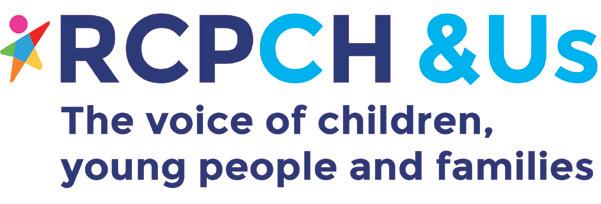
Transitioning to a new curriculum was never going to be easy, but after overcoming the challenges we can now start to reap the rewards

Dr Joshua Hodgson Registrar in Paediatric Intensive Care Medicine Representative for ePortfolio & Curriculum, Trainees’ Committee
Executive, RCPCH
Evelina London Children’s Hospital
WE ARE already one year into the new curriculum. Now we have hands-on experience, we can better understand how it’s structured and how it works. This is also an opportunity to reflect on the transition process and look to the future.
Progress+ has brought significant change to doctors-in-training, trainers and systems alike. We won’t pretend the journey has always been plain sailing, but we are now settling into a new training structure of seven years, two levels and more flexibility.
When the Progress+ curriculum was being designed, the College envisaged what ‘really good’ training would look like. This was structured around 11 training principles. These anchor our training in meaningful philosophies that provide an overarching view of what training should be. The Paediatrician of the Future document gives a guide to these principles and practical tips on how they can be implemented within local training programmes. Trainees have also produced resources on what each training principle means in practice through the Training Principle of the Month project. Another big change comes with the duration and structure of training. Eight years of run-through training have become seven (whole-time equivalent). And three training levels have become two. This enables doctors-in-training to become world-class consultants more quickly. It also acknowledges (and celebrates) that
many doctors-in-training take time out of the programme to gain additional skills that still contribute to their development as well-rounded and excellent consultant paediatricians and people.
Having only two training levels simplifies the process for doctors-in-training and trainers alike (with fewer learning outcomes to evidence). It separates the process of progressing to the Tier 2 (or Registrar) rota from training levels – allowing di erent doctors-in-training and regions to take this jump with more flexibility to suit their needs. The training levels are now called Core Training (training grades ST1-4) and Specialty Training (ST5-7). Within Specialty Training, all doctors-in-training must evidence the generic syllabus as well as their relevant specialty syllabus (general paediatrics or their chosen subspecialty).
As with the previous curriculum, there are 11 domains covering technical and non-technical skills. For each training level, each domain has an associated learning outcome describing what a doctor-intraining should have achieved within that domain at that training level. Each learning outcome has a small number of key capabilities that must be evidenced to complete that training level. For each, the syllabi have illustrations to give practical examples of satisfactory evidence. Lastly, there are some mandatory assessments (both formative and examinations) to complete at particular times.
One of the key aims of Progress+ is to promote flexibility. Lives are complex and training is hard, so there is no doubt that flexibility is a big help.
Progress+ has an increased emphasis on capability-based training – the idea that doctors-in-training accrue curriculum evidence at di erent rates and progression
should not be based on time alone. The default remains that doctors-in-training will progress through training grades and levels according to whole-time equivalent, but if a doctor-in-training has acquired all necessary evidence to progress through a gateway early then they should have the opportunity to do so. See the RCPCH capability-based progression webpage for information on the gateways and more.
Deep breath. The transition to a completely new curriculum housed within our muchdebated ePortfolio was a major piece of work. As trainee representative for the curriculum and ePortfolio, I have had a privileged insight into this.
I have seen many doctors-in-training lose evidence links and have to adapt to an overhauled interface (including ways to view linked evidence). Understandably, there is a lot of frustration.
I have also seen all RCPCH sta working tirelessly to try and manage these challenges. Much of the change has been imposed upon RCPCH by the ePortfolio company – risr. As a result, sta have been continuously meeting with risr, responding to queries from doctors-in-training and proactively implementing fixes/adjustments. Ultimately, these challenges have been confronted and we hope that, after a period of adaptation, the more streamlined ePortfolio will make Progress+ easier for all. However, we know there is still much to improve and have established an ePortfolio User Group – with doctor-in-training and trainer representation – to deliver this. Change is all about short-term pain for long-term gain. One year and much frustration later, we can look forward to reaping the rewards of a curriculum that celebrates the whole lives of our doctors-intraining, young people and families.




Oliver Anglin Clinical Director Babies, Children & Young People’s Transformation
NHS England –London
recently said, “You shouldn’t be able to look at a child and know they are the one in the class with asthma” and it sums up the aims of this year’s #AskAboutAsthma campaign quite neatly.
#AskAboutAsthma is an annual awareness campaign that takes place every year in September, just ahead of the spike in hospital admissions for asthma. Now in its fourth year nationally (eighth year in London), the campaign centres on the simple changes that can make a big di erence to how children and young people experience their asthma.
The statistics around asthma in children and young people show that there is much more to be done to help them manage their asthma and live symptom-free. At the moment, nearly half of children admitted to hospital have had an asthma attack in the previous year and 30% have had daytime symptoms in the previous week. But only a fraction have a personalised asthma action plan (PAAP) on how their asthma should be managed. Short-acting beta-agonist (SABA) inhalers are overused –it’s estimated that around 500,000 children and young people in England have been prescribed SABAs without a diagnosis of asthma (and without accompanying inhaled corticosteroids). This means it is unlikely their condition is being monitored appropriately with no annual reviews or PAAPs.
Asthma is the most common long-term medical condition a ecting children and young people – around one in 11 are a ected by the condition, which is around three in every classroom. It’s often not considered a chronic condition, but rather treated as a series of acute attacks. Many children have badly managed asthma, with over 20,000 children and young people admitted to hospital every year in England – over 4% of whom have such a severe

episode that they are admitted to intensive care. We are also becoming more and more aware of the impact of air pollution on lung health, particularly in those whose lungs are still developing.
Asthma is one of the top three causes of emergency admission to hospital and 75% of these admissions would be avoidable through the implementation of simple interventions, such as the four ‘asks’ of #AskAboutAsthma.
The daily webinars, one-day conference, podcasts, videos and blogs included in #AskAboutAsthma week can help everyone who comes into contact with children and young people with asthma to improve their understanding and practice, including:
● the impact of the new NICE/BTS/SIGN guidance on clinical care
● how asthma outcomes can be improved by building networks around the child bringing in housing, schools and other non-NHS partners
● the children who are slipping through the net in severe asthma referrals
● the impact of vaping (and nascent vaping cessation services).
We also heard from young people themselves on how asthma a ects di erent aspects of their lives. Good asthma
The 4 asks of #AskAboutAsthma
Children and young people with asthma should be supported by the NHS and their wider networks, including schools, to:
1 get an asthma action plan in place
2 understand how to use inhalers correctly
3 schedule an asthma review –every year and after every attack
4 consider air quality and its impact on lung health.
management is crucial to ensure young people can continue to do what they enjoy and what is important to them. A keen young footballer shouldn’t have to stand in goal – that child should be able to run around with their peers and play at whatever position they’re best in.
This year’s #AskAboutAsthma campaign ran from 9-15 September. You can find all the content from the week at www.transformationpartners. nhs.uk/askaboutasthma-2024 , including the recording of our flagship one-day conference.

Dr Nicola Bartrum
Paediatric ST4
Trainee Rep for The CoLab Partnership Royal Berkshire NHS Foundation Trust
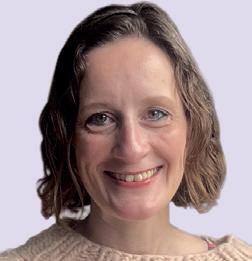
Dr Hannah Nicholson
Paediatric
Neurodisability Consultant
Lead for Education at The CoLab Partnership
Chelsea and Westminster Hospital NHS Foundation Trust
with medical complexity is one of the most challenging and rapidly evolving aspects of paediatrics. They often present with multiple chronic conditions and require intricate care requirements – and healthcare professionals can sometimes feel inadequately prepared to address these multifaceted challenges. That’s why it’s important to enhance healthcare professionals’ knowledge and empower them to support these amazing children and their families.
Who is the CoLab Partnership?
The CoLab Partnership or ‘CoLab’ was the brainchild of Dr Hilary Cass OBE. Cass recognised the changing landscape within paediatrics and noted the impact that this had on those caring for and working with children with medical complexity.
CoLab is a group of individuals and organisations united by a common goal: to improve the healthcare and support for children with medical complexity and their families. Through a collaborative platform, CoLab facilitates the exchange of best practices, resources and innovative strategies among professionals and
organisations to ensure that children with medical complexity receive the best possible care while supporting the wellbeing of both families and the professionals working with them. This initiative aims to bring together a wealth of knowledge, resources and best practices to transform the way paediatric care is delivered in the UK.
Why is CoLab needed?
1. Evolving needs of children and their families
As advancements in medical technolo continue, more children are surviving with complex medical conditions. These young patients often require comprehensive care, encompassing multiple healthcare domains, disabilities and sometimes lifelimiting illnesses. The current healthcare, education and social support systems can struggle to meet these diverse needs, leaving children and their families feeling frustrated and overwhelmed.
2. Lack of coordinated care
Families often lament the absence of a lead clinician who truly understands their child’s unique medical challenges and can provide support across hospital, home and the community.
3. Changing pressures on healthcare sta Paediatric healthcare professionals face new and demanding challenges. Traditional training may not adequately prepare them to care for a shifting patient population. For instance, those trained in acute care settings may lack the background needed for managing complex long-term conditions, disabilities and end-of-life care. This gap in training can

lead to ethical dilemmas and emotional stress, contributing to burnout and the recruitment crisis.
4. Societal expectations and ethical dilemmas
Changes in societal expectations have led to more emotionally charged ethical dilemmas in paediatric care. High-profi le cases such as Charlie Gard and Alfie Evans have highlighted these complex issues. CoLab recognises the importance of addressing these dilemmas in a more informed, constructive and compassionate manner, both within hospitals and in the public sphere.
Why are you telling me about this?
1. Complexity is everyone’s responsibility Complexity occurs in all settings. It is the responsibility of all those working with these children and their families to holistically consider their needs and act upon them. As paediatricians, we need to make sure that we are adequately trained and knowledgeable.
2. Every healthcare encounter is an opportunity to think holistically Although we are healthcare professionals, we manage more than just health and
A little bit about me…
Hello, my name is [xx]. I prefer to be called [xx].
I live with my Mum [name], Dad [name] and siblings [names]. They prefer you to call them [xx] (eg by their first name).
I communicate by [xx] (eg sentences, vocalisation, facial expression, gestures –means of communication can vary from patient to patient and it’s important to know how a child communicates when they are well).
When I am well I can [xx] (eg walk with support or make choices through eye gaze – children may stop doing things that they would do normally when they are unwell. Other professionals must know how a child is when they are well so they can quickly spot when something has changed).
I like [xx] (eg playing football or playing peekaboo – sharing things that the child/ young person likes means that we can make them feel more comfortable during the consultation).
I dislike [xx] (eg loud noises, new environments). When I feel worried or upset I may [xx] (it is important to have an awareness of things that the child/young person dislikes so that we can avoid it during the consultation).
If I am admitted to hospital, please can the admitting team let Dr [xx] know via XYZ@xy.net (this is to ensure that the team reviewing the child/young person knows how to contact their lead consultant to let them know if their help is required).
understand that child health is determined by more than just being physically ‘well’. To ensure that the children we care for thrive we need to consider their holistic needs: their health (both physical and mental); access to education; and environment and support (support networks and finances). Wider family needs, including the health of their carer, require thought and consideration. Every encounter with that child and family is an opportunity to explore their needs and offer support. Don’t miss an opportunity.
3. Small system changes make a big difference
As paediatricians, we know the tremendous value of our medical expertise in caring for children with complex conditions. However, we should also recognise that often the smallest adjustments can profoundly impact the lives of these families. Large-scale system overhauls, while well-intentioned, can be overwhelming endeavours that stall before
they start. Instead, we should identify focused areas of passion and use them as catalysts for meaningful change. One such ‘small change’ is including a brief introductory paragraph in our clinic letters. This simple addition provides critical personal context about the child and family, ensuring a more holistic understanding from the outset. Small steps like these humanise our care and demonstrate our commitment to treating the whole patient, not just their medical conditions.
4. Listen, listen and listen some more… As paediatricians, we are constantly learning and adapting to provide the best care for our young patients. After listening to some wonderful parents speak at the CoLab conference, several themes were repeated – despite the families having very different journeys and experiences. The poster overleaf captures some of those powerful messages in a simple, actionable way that we can all incorporate into our daily practices.
If you’re passionate about improving care for children with medical complexity, join CoLab and become part of our collaborative network to drive positive change through education and research. We need more passionate voices.
This QR code will take you to The CoLab Partnership website. Join today and let’s improve care for children with medical complexity together.

● Attend our regular online education events.
● Think local. Explore what happens within your trust. How can it be improved? Consider small change projects.
● Most importantly, involve children and families directly when considering changes that impact their care. Establishing a patient forum for your service provides invaluable perspective into what matters most.
● Nimmo S, Please don’t call me mum, BMJ 2019; 367 :l5373. doi:10.1136/bmj.l5373
● Hospice UK Conference 2019. Was this in the plan: Steph Nimmo in conversation with Tracey Bleakley: www.youtube. com/watch?v=XZ47ZV9siqM&t=1s
● Cass, Hilary, et al. Complexity and challenge in paediatrics: a roadmap for supporting clinical staff and families. Arch Dis Child vol. 105, no 2, pp. 109-114, Feb 2020
See the person, not just the parent
● Empower parents to be part of the team by asking them how they would like to be addressed
● Learn their names and show a genuine interest in their lives beyond the hospital
Timing is everything
● Timing can greatly impact how well information is received – consider the context of the family’s day when having important conversations and delivering difficult news
● Ask if now is a good time, if they would like anyone else with them, or find a better time 1 9 10 2 8 3 7 4 6 5
Share and be human
● Building a connection with the parents goes beyond the clinical setting
● Humanise the doctor-patient relationship and foster trust through open communication
Ask, don’t assume
● Take time to ask parents what they want, need, or would like to talk about –don’t assume
● Every child’s condition is unique; their parents are the best source of information about their specific needs and preferences
The power of teamwork
● Actively collaborate and coordinate your efforts with the multidisciplinary team
● Think of it as children playing together in the same sandpit rather than toddlers side by side
Parents are experts too
● Parents spend every day with their child and are experts in their own right
● Respect their knowledge and insights about their child’s condition, and involve them in decision-making
10 tiny acts that transform the journeys of parents of children with medical complexity
Dr Nicola Bartram, with thanks to the parents who shared their experiences

Learn their language
● Learn the forms of communication the child uses eg Makaton
● A couple of signs can bridge gaps and enhance your ability to connect with the child
Listen actively
● Parents want to feel seen and heard
● Be present and genuinely engaged in their concerns and questions
● Even if you can’t help in your role, just to say ‘I hear you’ can be powerful
Kind communication
● Clear communication is an act of kindness. Introduce yourself and make eye contact
● Have the courage to engage with parents in a genuine and empathetic manner
● Acknowledging their pain can make all the difference
Acknowledge the child
● Always greet and say hello to the child
● Simple gestures like a friendly wave or a cheerful hello can make a child feel more comfortable and at ease
The Guideline Development Hub aims to help create fewer, but high quality, guidelines

Dr Jan Dudley Consultant
Paediatric
Nephrologist
RCPCH Officer for Clinical Standards and Registrar
Bristol Royal Hospital for Children
OVER THE YEARS, I have led or supported the development of many clinical guidelines at local and national levels. Clinical guidelines can play a valuable role in improving healthcare by reducing unwarranted variations in practice. Highquality clinical guidelines are based on best-available evidence, are developed with the appropriate ‘stakeholder’ engagement, and are subjected to external peer review at the scope and draft guideline stage. Guidelines that lack adequate stakeholder input are likely to be limited to local use, resulting in widespread ine ciencies. Few clinical establishments have the resources to develop high-quality clinical guidelines. National guideline development groups (GDGs) in the UK include the National Institute for Health and Care Excellence (NICE) and the Scottish Intercollegiate Guidelines Network (SIGN), as well as the Royal Colleges and other medical professional membership organisations. NICE bases its recommendations on high-quality evidence,
which is often lacking in children and young people (CYP) due to the high prevalence of rare diseases in this population. As a result, CYP can be excluded from these guidelines, but arguably, a lack of quality evidence increases the need for clinical guidelines.
At RCPCH, we support specialty and special interest groups to develop national high-quality clinical guidelines for children and young people by providing tools, training and endorsing guidelines according to national accredited standards.
We have recently launched a Guideline Development Hub with an interactive step-bystep flowchart guiding you through the process with template documents at each stage.
In my experience, these are the most common pitfalls of guideline development:
● absence of lay representatives (2) on GDG
● failure of GDGs to declare conflicts of interest
● omission of stakeholder groups
● lack of scope in development/consultation
● unclear or ambiguous recommendations and audit measures
● identification of potential barriers to implementation
● no lay summary.
Initial steps
● Register intent to develop guideline
● MoU to establish ownership and responsibilities
Scoping
● Develop draft scope
● Consult on draft scope
Write up
● Consult on draft guideline
● Collate comments and record responses
Publish & disseminate
● Prepare guideline for publication
● Publish and share

While we have provided comprehensive resources to support national guideline development, we recognise the benefits of having guideline ‘experts’ on GDGs. This is a ‘call to arms’ for paediatricians interested in being trained in guideline development and thereafter providing expertise on national GDGs. We will be hosting our first workshop on systematic reviews and guideline development, so register your interest here or follow the QR code and join us!
As well as highlighting the pathway for and common pitfalls of guideline development, our hub sets out the principles of systematic review processes with the help of an eLearning module. The hub also sets out how to develop guidelines when evidence is lacking or of poor quality, using formal consensus techniques such as Delphi. Using this technique introduces rigour and objectivity, reduces the risk of bias, and allows an assessment of the likely implementation of recommendations.
Recruitment
● Recruit Chair and members
● Declare/record interests
● Identify stakeholders
Guideline development
● Finalise scope and GDG (Guideline Development Group)
● Develop search strategy
● Carry out search, evidence synthesis
● Formulate, prioritise recommendations
● Identify evidence gaps, audit measures
● Write draft guideline
Consultation and final write up
● Amend guideline based on consultation
● Develop any complementary material and clinical audit tools
Clinical guidelines, when rigorously produced and implemented, can optimise the delivery of safe and cost-e ective healthcare. We hope that by supporting the development of fewer but national high-quality clinical guidelines and a ‘train the trainer’ approach, we will reduce ine ciencies in healthcare as well as unwarranted variations in practice.

Scan the QR code for the Guideline Development Hub




■
Help us inspire the next generation by encouraging your medical students and foundation doctors to consider a rewarding career in paediatrics.
■
Your mentorship can make a significant impact and help young doctors to discover a fulfilling career in paediatrics today!
■
Scan the QR code (left) to share our #ChoosePaediatrics page where aspiring paediatricians can access a wealth of resources designed to ignite their passion.
There's no job quite like it!




Dr Katrina Cathie MBE
Consultant
General Paediatrics and Paediatric Research
Co-Chair
GAPRUKI University Hospital Southampton NHS Foundation Trust




Dr Louisa Pollock
Consultant
General Paediatrics and Paediatric Infectious Diseases
Co-Chair
GAPRUKI
Royal Hospital for Children, Glasgow
THAT AIMS to improve health outcomes for children, GAPRUKI (General and Adolescent Paediatric Research Collaborative in the United Kingdom and Ireland) informs evidence-based care for acute and chronic childhood conditions through multi-centre collaborative research. As general paediatricians and co-chairs of this network, we want to explain why we think building capacity in general paediatric research is important – and why GAPRUKI needs you!
The paediatric research gap
We know that children and young people (CYP) are under-represented and under-served when it comes to research. A lack of paediatric-specific data means that most medicines for children are used ‘o -license’, increasing the risk of side e ects and sub-optimal dosing. Only 7% of current open NIHR-funded studies are aimed at CYP, with general or community paediatric studies responsible for a mere 1%.1 Disappointingly, only one in 20 paediatricians have any research involvement.2
The evidence base for the management of some of the most common conditions in childhood remains poor. Take asthma as an example – the most common long-term condition among CYP, a frequent cause of hospital admission, and one of the leading causes of preventable childhood death in the UK.3

As a trainee in North East England, I [Louisa] was taught the most e ective intravenous treatment for severe asthma was salbutamol – and that aminophylline was toxic. I then moved to Scotland where I was told the opposite. That was over 20 years ago; little in the evidence base has changed, and practice still varies widely across the UK. It’s no surprise, then, that when GAPRUKI undertook a consensus-based research prioritisation exercise in 2019, this question was at the top of the list.4
Top research priorities for paediatricians also included the e cacy of high-flow oxygen versus CPAP in bronchiolitis, the e cacy of omeprazole in gastro-oesophageal reflux, and the most e ective ways to manage constipation. All common conditions with a high burden on children, families and health services.
Some barriers to child health research apply across all paediatric sub-specialties, including a lack of prioritisation of child health research by pharmaceutical companies and other funders. Others are more specific to general paediatrics and relate to how general paediatricians are trained and the huge pressure on the services they provide.
Few generalists have dedicated research time and a large proportion of research studies are undertaken in tertiary centres by sub-specialists rather than in district general hospitals or community settings where the majority of CYP are cared for.5 Early career research training is also less common in general paediatrics compared to other specialties. Why are so few general paediatricians active in research?
When we have asked colleagues to join GAPRUKI the first response is usually, “I don’t have the time”. Postpandemic, general paediatric services are busier than ever. Finding time for research (and convincing managers to fund that time in job plans) can feel like an impossible task. Failing to value research time is a false economy for the NHS – we will miss opportunities to develop new diagnostics, vaccines and interventions that could improve health outcomes and reduce burden on services long-term.
Another common response is, “I am not an academic”. In our view, the false dichotomy between clinician and academic is hugely detrimental to improving both clinical and research practice. Research and evidence-based medicine should be an integral part of clinical training and practice, and e ective research needs to be informed by clinical realities and priorities.
RCPCH recognises this in making research and scholarship a curriculum domain in Progress+, but there needs to be concrete action to deliver meaningful research training to general paediatric trainees when they have so few consultant research role models and limited research opportunities. Today’s trainees are tomorrow’s role models and the time to build a research culture in general paediatrics is now.
What are our goals?
We want to strengthen research in general and community paediatrics in the UK and Ireland by:
● identifying research priorities that target gaps in evidence-based care and advocating for funding to develop and support studies which address these priorities
● facilitating research collaboration by linking paediatricians and other healthcare professionals interested

in research within the UK, Ireland and internationally
● ensuring frontline paediatricians, other healthcare workers, and children and their families have a voice in the design of general and community paediatric research studies
● developing research training opportunities for general and community paediatric trainees and allied health professionals
● working constructively with other research networks – such as PERUKI (Paediatric Emergency Research in the UK and Ireland) and the NIHR Research Delivery Network – and with other stakeholders including RCPCH, the RCPCH Trainee Research Network and the BAGP (British Association of General Paediatrics).
What have we done so far?
Focusing on our identified research priorities, we helped design and roll out the BACHb study – a trial of respiratory support in bronchiolitis.6 We also successfully
Whether you are already research-active, would like to become more involved in research, or simply want to stay informed about new studies, we encourage you to join us. Members will be invited to our monthly online meeting and kept informed of new studies, conferences and research training opportunities. We are open to everyone including general and community paediatricians,
advocated for HTA funding of research in the management of acute severe asthma, gastrooesophageal reflux and UTI sampling, and have submitted applications in each of these.
What will we do next?
We want to build our membership so that every paediatric unit in the UK has at least one person linked to our network, to ensure all children have equal opportunities to be included in research and to ensure we hear diverse voices to inform our research practice.
We are joining forces with research networks from the US, Canada, Australia and New Zealand in the new INSPIRE (International Networks for Pediatric Inpatient Research and Excellence) network.
We are hoping to organise a joint conference with PERUKI and are excited to collaborate with the new RCPCH TREES initiative. We want to be inclusive, collaborative and efficient in achieving our shared goals to improve child health.
1. NIHR, Open Data Platform (ODP): odp.nihr.ac.uk
2. D Carr and E Loucaides. Research exposure in current training: where are the gaps? Archives of Disease in Childhood, 2024
3. Royal College of Paediatrics and Child Health (2020). State of Child Health in the UK: stateofchildhealth.rcpch.ac.uk
4. K Cathie, AG Sutcliffe, S Bandi, D Coghlan, SW Turner and C Powell. Priorities for child health research across the UK. Archives of Disease in Childhood, vol. 107, no. 5, pp. 474-478, May 2022
5. HM Sammons, J McIntyre and I Choonara. Research in general paediatrics. Archives of Disease in Childhood, vol. 89, pp. 408410, 2004
6. NIHR, Breathing Assistance in CHildren with bronchiolitis (BACHb): a group-sequential two-stratum multicentre openlabel randomised clinical trial of respiratory support in infants with acute bronchiolitis: fundingawards.nihr.ac.uk/ award/NIHR152262
“We want to ensure all children in the UK have equal opportunities to be included in research”
trainees, students, nurses and allied health professionals – and we are particularly keen to identify regional trainee representatives. You can apply by completing the membership form or scanning the QR codes. Join us and help ensure all children in the UK have access to the excellent, research-informed clinical care that they deserve.


The role of health play specialists in children’s healthcare: insights for paediatricians

Dr Tom Rance
Paediatric SpR
Great Ormond Street Hospital
@DrTomRance

Adrian Voce Head of policy
and public affairs
Starlight
Children’s Foundation
IT MAY SEEM
counterintuitive, in the context of serious illness or specialised treatment, to think about the importance of children’s play. Yet the pivotal role of health play specialists (HPSs) in supporting the psychological wellbeing of paediatric patients is becoming increasingly recognised. And for children themselves, it’s a no-brainer.
HPSs are vital to creating therapeutic environments where children feel safe, engaged and understood. NHS Careers describes their role as: “[using] therapeutic play… to reduce anxiety and the risk of psychological trauma”. It emphasises the role of health play specialists in “working with other healthcare professionals to prepare children for treatment and engage them during di cult procedures”.1
HPSs are not to be confused with play therapists. The latter may work within children’s psychological services, or as part of CAMHS (Child and Adolescent Mental Health Services), and work with children’s mental health, perhaps supporting recovery from past trauma. On the other hand, HPSs work in acute, community or palliative care (and in emergency services), and help to mitigate the risk of psychological harm or trauma to children as a result of their condition or its treatment.
After NICE (2021)2 highlighted these important functions of the play team, NHS England (NHSE) asked the charity Starlight to jointly chair a task force to explore the current ‘state of play’ in healthcare and to develop tools for improving and extending these important services. Starlight published
Starlight supports health professionals using therapeutic play to boost children’s wellbeing and resilience during treatment, care and recovery from illness. Starlight’s mission is to enable all children in the UK to have their right to play protected and provided for when
the task force findings in 20233 – the main recommendations were:
– Guidance on commissioning and designing health play services
– Recommended standards for health play services
– A workforce development strate for health play sta
Following the task force, a proposed workforce strate 3 was published in June 2024 by Starlight together with Skills for Health and the Society of Health Play Specialists. New guidance and standards documents, prepared by Starlight, are to be published by NHSE in the autumn.
The research4 shows that the current provision of health play services is inequitable, inconsistent and widely inadequate for the level of need. The workforce strate proposes 3,000 more play sta , over nine years, to provide the level of cover in acute inpatient care in England recommended by the guidance. The charity is also calling for a review of commissioning service specifications to ensure that a proportionate element of play service provision is included in all relevant contracts.
Ahead of these systemic changes, what can paediatricians do?
● Advocate for the integration of HPSs into multidisciplinary teams. Ensure that play services are included in care plans and recognised as essential rather than optional.
● Collaborate with HPSs to design and
they are receiving healthcare, in or out of hospital. Informed by research, the charity provides direct services to children and their health play teams, and advocates for the full recognition of children’s play as an integral component of their health and care.
implement play-based interventions tailored to individual patient needs.
● Participate in training sessions to understand the principles of therapeutic play and its application in clinical settings.
● Engage in research to evaluate the impact of play services on paediatric care. Use evidence-based practices to improve the quality and e ectiveness of these services.
● Contribute to the development and implementation of policies that standardise and mandate health play services in all paediatric settings. Ensure these are aligned with existing NICE guidelines and, when it is published, the more detailed guidance of NHS England and Starlight.
For more information, visit www.starlight.org.uk
1. NICE (2021) Guideline on babies, children and young people’s experience of healthcare. [NG204].
2. Starlight (2023), A common purpose, report of the task force on children’s play in healthcare.
3. Starlight (2024), The best possible experience for children, a workforce development strategy for play services supporting babies, children and young people in healthcare.
4. Starlight (2023), Reducing trauma for children in healthcare: play in hospital report.
Dr Alice Willson and Dr Emily Parker discuss why they applied to work as Clean Air Fellows, and what changes are needed to reduce air pollution and mitigate its impact on child health

Dr Alice Willson
RCPCH Clinical Fellow
North Western Deanery
@dralicewillson
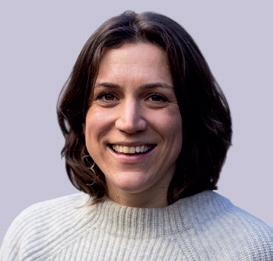
Dr Emily Parker
RCPCH Clinical Fellow Newcastle Hospitals NHS Foundation Trust
@emilyrparker
ALICE: Emily, it’s lovely to be working with you. Tell me about how you got involved in this role.
EMILY: Thanks, Alice. Before I joined RCPCH, I was working as a Clinical Sustainability Fellow in Newcastle. A project to reduce the environmental impact of asthma inhalers got me thinking about air pollution and asthma prevention, so the RCPCH Clean Air Fellowship seemed like the perfect next step for me. I studied social anthropolo before medicine and worked in the charity sector in human rights and built environment roles, so I’ve always been motivated to see patients in the context of their social and physical environments. What about you?
ALICE: That’s so interesting. It’s a di erent angle from me as I’ve completed most of my paediatric training; I’m a generalist so sticking with General Paediatrics, but with a respiratory/public health slant. My interest in air pollution has come from working in international health, as well as in deprived areas around Manchester. We have some of the worst respiratory health in the country, with the highest A&E admissions for asthma.
EMILY: Yes, I’m increasingly seeing children su ering from the e ects of air pollution in my A&E shifts in Newcastle, too. Last month I saw a little girl with a persistent cough, and it transpired that her family’s council house was poorly ventilated and mouldy. I felt pretty
powerless to help her in A&E, but I still think we need to have these conversations with patients and their families. If we don’t, we are missing an important part of the picture. I’m hoping that new laws forcing landlords to act on damp and mould in social housing will help.
ALICE: Well done for asking the questions about housing. I think people still feel intimidated talking to patients about air pollution.

Children are particularly vulnerable to air pollution
EMILY: Yes, I’ve heard colleagues say they don’t have the time, or that they don’t know enough about it, or just that they don’t want to open a can of worms when they don’t have easy solutions…
ALICE: All good points. And they apply to other core determinants of health (finance, housing, smoking history etc). But I’m convinced it’s worth asking the questions about air pollution. It’s now the second biggest risk factor for disease globally and the World Health Organization has made climate change (and air pollution) a strategic priority.
EMILY: I find it interesting that paediatricians don’t draw more attention to air pollution. We know it adversely a ects health from before birth through to adulthood, and that it can impact every organ in the body. Why aren’t we more vocal?
ALICE: There might be a lack of awareness –we’re not taught much environmental health at university and it’s not front and foremost in our postgraduate curriculum, either. You’re a member of Medact, how do you think medics should be advocating?
EMILY: Well, we know that doctors are some of the most trusted voices in society and their involvement in advocacy varies in di erent countries. For instance, in countries more obviously a ected by air pollution (for example, Bangladesh), doctors are more
likely to speak out or work on campaigns with NGOs. I think perhaps in the UK there’s more of a sense that public health is not part of a hospital doctor’s role. But that’s not true – air pollution directly impacts our work. In 2017-19 an estimated 7% of paediatric asthma admissions in London were linked to spikes in air pollution, and reductions in air pollution concentration correlated with reduced hospital admissions.
ALICE: So what are some practical tips for paediatricians who might want to advocate around air pollution in the UK?
EMILY: Ultimately, the best opportunity for improving air quality is through national and local government policy. We have just launched our new Position Statement on Air Pollution in the UK, which paediatricians could send to their MPs with a short cover letter. At work, it’s worth encouraging your hospital to implement the Clean Air Hospitals Framework. And personally, you could make changes such as choosing public transport, walking or cycling over driving, and choosing not to burn wood at home if you have alternative fuel sources. We must be careful about placing blame on the individual, but it’s nice to feel that you can be part of the solution.
ALICE: Amazing advice, thanks!
For more, see our Air Pollution in the UK Position Statement and join our Clean Air Network




Professor Carly (Caroline) Fertleman
Consultant
Paediatrician
Whittington Health
Professor of Paediatric Education
Great Ormond
Street Institute of Child Health, University College London
IHAVE A SUPER-COOL pre-retirement consultant general paediatric package. The NHS goes on and on about retiring in di erent ways and is keen employers consider this when losing their most experienced sta in the workforce. I am not retired but I am pretty part-time and live abroad most of the year. So how did I do this?
I was preparing a submission for the national Clinical Excellence Awards (CEAs) several years ago. Will Carroll helped me think about things and I decided I could proceed on the environmental ticket. I wanted to show that my clinical practice was environmentally sound and that I was a good investment for my Trust. I looked up all my colleagues’ new-to-follow-up ratio for general paediatric clinics. Mostly they had the national average of 2:1. Some better at 3:1 and one even at 4:1. However, I was able to see almost 10 new patients to 1 follow-up. This is because I nearly always o er email access to the parents. I ask them to take out their phones and I send them an email there and then. They don’t have to worry that I will remember to send them one. I have been doing this for years and have published about it. Email follow-up to parents counts towards my clinical workload and is in my job plan. Additionally, I have been around the block a few times and seen most conditions and, probably more importantly, I am happy to live with ambivalence and uncertainty where others will often resort to tests to reassure
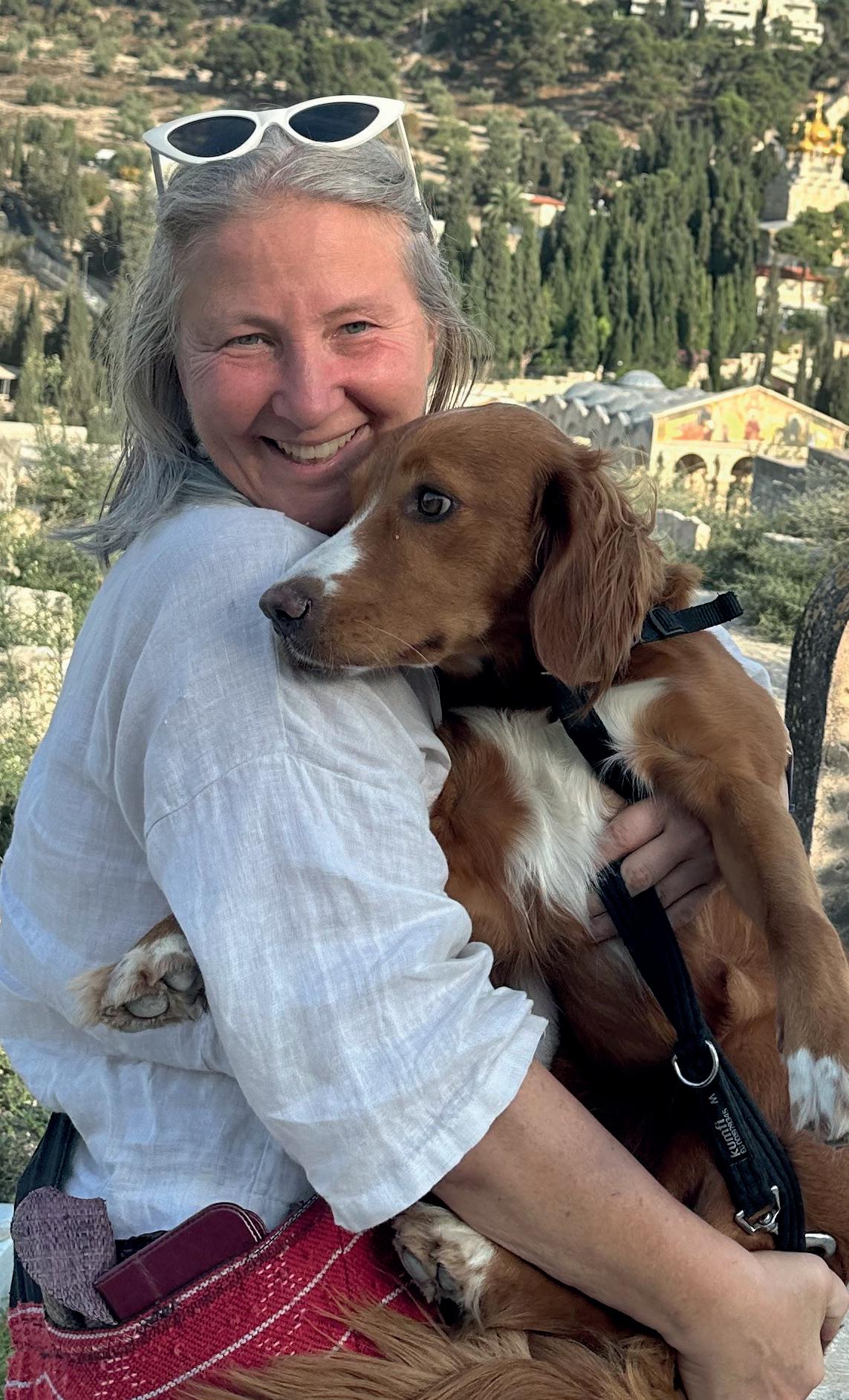
Working part-time enables Carly Fertleman to spend more time with her dog
themselves. A large part of my workload is diagnosing functional illness, and the guidance is clear – avoid tests at all costs.
For a month, I collected loads of data. This included qualitative feedback from parents: where they lived, how they got to their appointments and how much time was lost from work and school. I could clearly evidence the cost of follow-ups in terms of finance, education, and carbon footprint.
So, with this ‘proof’ of my worth, I suggested an annualised job plan where I
“I suggested an annualised job plan where I would return to the UK in busy times and undertake clinics to clear the waiting list”
would return to the UK to provide cover in busy times. In that time, I would undertake loads of clinics to clear the waiting list. And this is what I do. I live in Ja a, Israel for most of the year and return to see patients in clinics and provide clinical back-up. I have several other roles that I can shoehorn in when I am back in the UK. I am currently on 4PAs and can only do this work in the UK.
To keep up my clinical skills, my UK Trust was keen I get my Israeli medical license. It has freed up a lot of time for volunteering where I have been tangerine- and tomato-picking, goat-herding and bottle-feeding kids (baby goats!), sewing lightweight stretchers and teaching emergency paediatrics to trainees.
I really wanted to have time to be more creative as a writer of short stories (Carly does this, that, and the other), as a photographer (the adventures of Carlos), and as an artist (my latest series is called Cosmetic Imprisonment – the plight of women?). You can enjoy them all on my blog.
Blog: https://howtimegoesfasterasyou getolder.blog Instagram: @drcarlyfertleman (for parents) and @ProfessorCarlyF (top tips to pass paediatric clinical examinations).
Would you like to share your experience of peri-retirement? We’d love to hear it. Email the team: milestones@rcpch.ac.uk
Working with the RCPCH Ireland Executive Committee has enabled Dr Rory Sweeney to highlight injustices and drive change

Dr Rory Sweeney RCPCH Deputy Officer for Ireland
(Northern Ireland Specialist Transport and Retrieval) Paediatric Consultant can be fastpaced, working to provide advanced resuscitation, stabilisation and interhospital transfer of critically ill infants, children and young people from hospitals which are spanned geographically across the whole of Northern Ireland (NI) and also between NI and the children’s hospitals in the Republic of Ireland as part of the All-Island Congenital Heart Disease Network.
Not only is the work fast-paced but there are added pressures here in NI due, in large part, to the resource constraints and budgetary pressures faced by the Department of Health (DoH) in recent years caused by: austerity measures filtering down from the Government; the necessary service reconfiguration during the pandemic; and the long periods when the NI Assembly had collapsed.
This complicated backdrop very much influenced my drive to become involved with the RCPCH Ireland Executive Committee as Deputy O cer for Ireland, a post I took up in summer 2023. My voice on this important committee o ers the opportunity to crucially add support to the collective voice of the RCPCH Committee here on the ground and to drive for change in the wider services by, for example, meeting with ministers, politicians, government o cials and senior leaders from partner and stakeholder groups, including other Royal Colleges and Health and Social Care organisations. The committee also acts as a voice for NI to RCPCH central, to the College Council, Policy and Advocacy Executive, and the College Strate review and delivery.
An example of the power of our collective voice was in the delivery of the RCPCH Ireland landmark report, Worried and Waiting: A Review of Paediatric Waiting Times in Northern Ireland, in April of this year. This stark report outlined the shocking rise in waiting times for children and young people in NI from summer 2016 to summer 2023. During this period there had been an increase of 172.6% in

overall outpatient waits for children, with the number of children waiting at a record high of 22,272 – by far the longest waits across the UK. It highlighted the reality that paediatrics and children’s services in NI had been left behind in reconfiguration programmes thus far, and that children generally had been hideously impacted by austerity.
The report was launched in the Parliament Buildings at Stormont to a packed audience of paediatricians, politicians, children and young people, Royal Colleges, and the NI Commissioner for Children and Young People. The launch featured widely in NI media, alongside the recommendations that NI could begin reversing this devastating trajectory of waiting times by taking a ‘whole child’ approach to service provision, workforce planning and poverty reduction. The committee has a meeting planned in autumn with the health minister to pick up on this report six months on.
Individually, I also represented the voice of the College/Ireland committee in the DoH NI review on Enabling Safe, Quality Midwifery Services and Care, o ering a paediatric voice on numerous issues: paediatrics workforce pressures and sta ng levels; critical transfers to neonatal units from freestanding midwifery-led units without the paediatric support – especially with the current pressures on the NI ambulance service; and interdisciplinary training and education opportunities. This important report is due to be published in autumn 2024.
We are recruiting for a new Officer for Ireland to lead the RCPCH Ireland Executive Committee. To find out more, and/ or to get involved in the work of the committee, email enquiries.ireland@rcpch.ac.uk
Identifying where you can focus your energies to make a difference is key to protecting your mental health and wellbeing, says Dr Jess Morgan

Dr Jess Morgan Dinwoodie RCPCH Fellow Careers and Communities Team, RCPCH
UP UNTIL A FEW years ago, I was on a very linear pathway to becoming a paediatric consultant. Halfway through my ST5 year, burnout and mental illness happened. Everything I expected of myself was suddenly in question. Upset, frustrated and confi ned by the systems and culture within which we work, I left medicine completely. Stepping away gave me the space I needed to reflect on what helps and hinders my wellbeing. Now, five years later, as I navigate returning to paediatrics, I have a much better understanding of where my power lies in protecting my wellbeing and how I can contribute to improving the wellbeing and working lives of others.
starts with me
Like many, I dislike the concept of individual resilience, however, I feel I have a personal responsibility to look after myself. I have learnt to prioritise time with my family and friends, to set boundaries, leave work on time, and pick and choose the projects I have the capacity for. I can’t expect anyone else to do this for me.
My colleagues and team
I’ve come to understand that my behaviours and attitudes at work

“I have learnt to prioritise time with my family and friends, to set boundaries, leave work on time, and pick and choose the projects I have the capacity for”
directly impact the wellbeing of my colleagues. There’s something empowering in realising that small acts of kindness, compassion and inclusion are all within my reach, and that I can play a role in building belonging and connection in my team.
The wider culture and systems within which I work
It’s easy to see how we can get caught up in a negative, helpless
spiral when faced with current NHS pressures and working conditions. However, realising that I have the power to collaborate, to network and to influence the basics gives me a sense of purpose and meaning in my work. These realisations led me to Thrive Paediatrics, an exciting RCPCH project that supports paediatricians to have long, fulfi lling careers in the specialty. For some people, this might be an inner journey to improving
their wellbeing, while others may take a more practical approach at a departmental or organisational level. There is no right or wrong here. Instead, it’s about asking yourself where you can use your ener to make a di erence. With funding from the Dinwoodie Charitable Company, we have developed the Roadmap
for Transforming Working Lives of Paediatricians, o ering paediatricians an evidence-based framework of what ‘good’ looks like when it comes to our wellbeing and working lives. Over the past year, we’ve been facilitating conversations about how to use this document in the context of our stories and experiences. One of the great
strengths of this project is that your stories and experiences of day-today life as paediatricians continue to inform both the project direction and the resources we develop to support you in this work. There is no better example of this than the design and development of the Thrive Paediatrics Resource Hub, which launched in early October.
to protect and promote wellbeing, many of us will still experience challenges at some point in our careers. Navigating these difficulties can leave us questioning our careers in paediatrics or even our identity as doctors. Several paediatricians have generously shared their journeys on the hub to highlight that nobody is alone and that, with the right support, we can indeed find a way to thrive again.


In response to the needs of our Thrive Paediatrics community, we have gathered a range of evidence-based resources to support writing business cases and developing projects to improve working lives or offer opportunities for paediatricians to learn more about the topic. These materials are provided in various formats, ranging from articles to books, videos and podcasts. Topics include compassionate leadership, civility, psychological safety and burnout, with plans to continue adding content over time.
The Thrive Paediatrics Resource Hub also provides an ever-growing collection of reallife examples of the roadmap in practice. Here, paediatricians up and down the country describe work, projects and initiatives they are already doing to improve the wellbeing and working lives of their colleagues. These examples are mapped to statements from the roadmap, offering ideas and inspiration for what you could try in your team or department when faced with a similar challenge.
Despite our best efforts
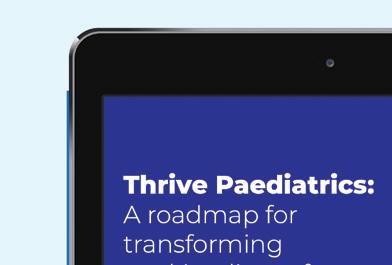




Thrive Paediatrics has compiled a range of resources that offer advice and promote best practice

Finally, over the next few months, we will be developing a fourth area of the hub that will house content to support your continued professional development.
As our Thrive Paediatrics community continues to grow, we will share more examples of good practices and use the hub to support you in your work to improve wellbeing and working lives. If you have an example to share, please email thrive@rcpch.ac.uk or join our community by following the links at www.learning.rcpch. ac.uk/thrive







A
monthly webinar series to help trainees engage with research

Dr Jess Schofield
ST4 trainee from Cheshire and Merseyside
Project lead for TREES
Alder Hey Children’s Hospital
AS DOCTORS, WE know clinical research is essential for evidencebased medicine and thus the best possible care for our patients. Yet there has been a historical reluctance to perform research in children, due to concerns about the potential dangers of experimental therapies, the burden of additional invasive testing, and the ethics of research when individuals are not able to consent.
In recent years, these anxieties have generally been overcome with an understanding of the improved outcomes associated with paediatric-specific research. However, we still have an existing research gap to close and other issues to address, including a shrinking clinical academic
workforce, barriers to clinical academia and poor paediatric representation at a policy-making level.
The development of research competencies within its trainee body has been a priority for RCPCH since Turning the Tide, a 2012 report by the College into UK child health research. It highlighted declining numbers of academic paediatricians at a consultant level and poor self-reported confidence and competence with research in paediatric trainees. Research competencies became a fundamental part of the RCPCH curriculum in 2018, and that has been made more substantial with the introduction of Progress+. However, the ever-increasing pressures in the NHS clinical environment can present challenges for trainees. In a 2021 survey conducted by the RCPCH’s TRN, 95% of trainees indicated a desire to be involved in research but 86% did not have any protected time to do so. Other reported


Dr Richard Daniels
Paediatric Registrar
St Mary’s Hospital
@DrRDaniels
REGULAR READERS
OF Milestones may recall last summer’s piece on Sir James Calvert Spence and it is with great excitement that we can share the news that Spence’s childhood home now has a Blue Plaque in recognition of his immense contribution to child health and North East England. The plaque was installed on the house, on
Queen Street in Amble, Northumberland, during a ceremony on 7 September. This all came about due to the e orts of Sir Alan Craft, emeritus Professor of Child Health at Newcastle University – the chair founded by Spence.
In 2020, Craft spoke at a local history meeting attended by retired GP Paul Creighton, who felt that
We’d love to hear from you, get in touch through our channels
X @RCPCHTweets
Facebook @RCPCH
Instagram @RCPCH milestones@rcpch.ac.uk
barriers included di culty finding or accessing research opportunities, the length and complexity of the process being at odds with the intense demands of clinical training itself, and a paucity of access to structured training in research.
The RCPCH Training Research Network (TRN) was established to support paediatricians in their academic development at an individual, regional and national level. A database of research funding opportunities and an academic toolkit can be found on the College’s TRN web page.
TRN’s new initiative – TREES (Trainee Research nEtwork Education Seminars) –is a monthly webinar series hosted by regional TRNs across the UK. TREES will run 45-minute webinars on the last Tuesday of the month at 13.00. The next session, Clinical Trials with Statistical Interpretation, by Dr Ashley Vardon (NIHR Academic Clinical Lecturer, University of Birmingham, PhD Cancer Biolo and Senescence), streams on 29 October. For more information and to register for the webinars, visit www.rcpch.ac.uk/resources/traineeresearch-network-education-seminars-trees
the current owner of the property would be amenable to the historic resident being recognised and, four years later, the plaque is in place. The ceremony was attended by local dignitaries, Andrew Gennery, the current Sir James Spence Professor of Child Health, and a delegation from the RCPCH, which included President Steve Turner. The plaque was unveiled by Spence’s
granddaughter, Jane Elphick, who is herself a local GP.
It is really exciting to see the history of paediatrics recognised in real life, and this would be a fantastic thing to happen all over the UK. If you know of a site near you that’s of historic paediatric significance, please get in touch with the RCPCH. Hopefully, this can be the first of many such plaques.
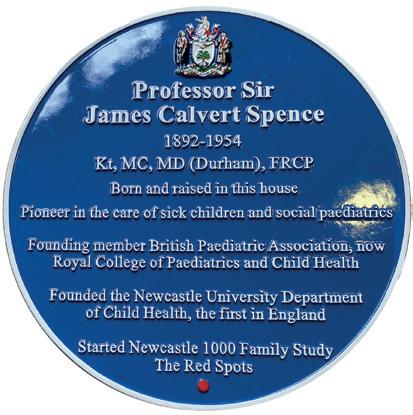
Clinical Lecturer and Consultant in Paediatric Infectious Diseases, Royal Belfast Hospital for Sick Children
@DrHelenGroves
1. Describe your job in three words
Detection, dedication, discovery.
2. After a hard day at work, what is your guilty pleasure?
Pistachio gelato and a garlic bread pizza.
3. What do you find particularly challenging about your time in academia?
It’s hard to stop working when there’s always more to do.
4. What is the best part of your working day?
Working with a team of great colleagues.
5. What was the best advice you received as a trainee?
Often you learn best from failures – when things don’t go to plan, learn from it and press forward. Don’t give up.
6. Who is the best fictional character of all time and why?
Guilty pleasure confession time… I was obsessed as a teenager with Stargate ’s Samantha Carter. She’s a science expert, worldleading theoretical astrophysicist, engineer and Air Force captain who saves the world multiple times! What’s not to love?!
7. What three medications would you like with you if you were marooned on a desert island filled with paediatric patients?
Paracetamol, salbutamol inhalers, oral co-amoxiclav – don’t judge me, antimicrobial stewardship friends, it’s a desert island!
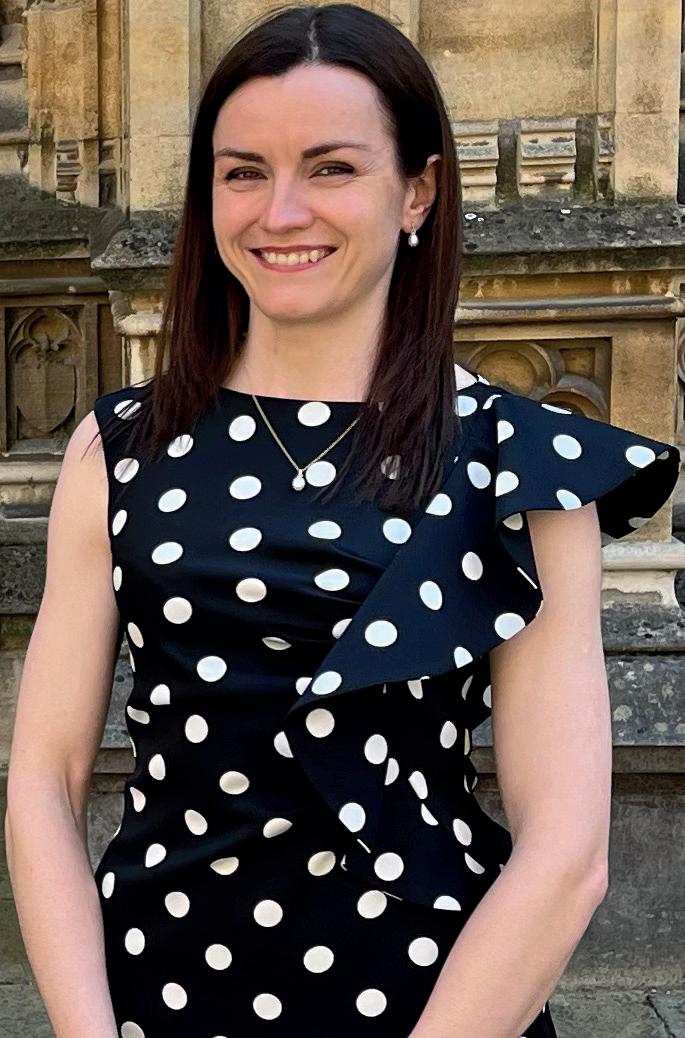
8. If you were bitten by a radioactive gerbil, what would you like your superpower to be and why?
Telekinesis – I wanted to be like Matilda as a kid.
9. What would you say to yourself as a medical student?
Given the chance, I would choose this career again – it’s tough and hard work at times, but it’s also filled with moments of joy and has opened up doors to help people in ways I never thought possible.
10. How can you and your colleagues inspire the next generation of academic paediatricians?
Passion inspires so my advice is to pursue what you are passionate about, especially in academia.
Dr Hannah Norman-Bruce
Doctoral fellow and paediatrician (ST7), Royal Belfast Hospital for Sick Children @hannahrubynb @precisestudyNI
1. Describe your job in three words Reading, writing and rewriting again.
2. After a hard day at work, what is your guilty pleasure? Stopping everything and doing bathtime with my son.
3. What do you find particularly challenging about your time in academia?
I miss seeing patients every day and the immediate rewards of clinical work.
4. What is the best part of your working day?
Seeing tearoom ideas grow into big projects.
5. What is the best advice you have received as a trainee? No OOP-C is an OOPSY… time out of training has been some of the best years of my career so far.
6. Who is the best fictional character of all time, and why? I’d say Meredith Grey from Grey’s Anatomy. For seemingly balancing full-time research and full-time clinical work while also being a mum and immortal?!
7. What three medications would you like with you if you were marooned on a desert island filled with paediatric patients?

Helen would have the antibiotics covered, I’d bring paracetamol, ondansetron and ice lollies.


8. If you were bitten by a radioactive gerbil, what would you like your superpower to be and why? The ability to recall anything I’ve read in an instant.


9. What would you say to yourself as a medical student?


In 2008, I was told by a medical school admission o cer that dyslexic students (like me) “should not apply”. An academic is not a ‘certain type’ of doctor and a mixed team is a stronger team.


10. How can you and your colleagues inspire the next generation of academic paediatricians?


Dip your toe in early where you can, especially with the new shape of training. One project leads to the next.

I LOVE SCIENTIFIC documentaries, especially those about medical research, and movies about individuals who have rare conditions that are medical mysteries until someone thinks outside the box. One of my favourite movies is Brain on Fire, which is based on a true story.
I also love getting to know why things happen, how things work and why someone would do what they do. Because of this, I love true-crime documentaries. One of my favourites is What Makes a Psychopath?, which explores physiological traits and the nature versus nurture debate.




Amy
Rushbrook
ST8 Paediatrics
Hampshire Hospitals NHS Foundation Trust
IN THE RCPCH position statement on mental health, published in 2020, the Officer for Mental Health, Dr Karen Street, said: “Our patients’ mental health is our business. There is a joint responsibility to provide necessary services across the children’s workforce… Together, we can work to develop improved and integrated mental health services.” The statement goes on to recommend that paediatric training includes the management of common mental health issues and that paediatricians with higher exposure to issues need more extensive training.




Marisa McMillan
Paediatric
Registrar (ST7)
Salisbury NHS Foundation Trust
HYSTERICAL explores an outbreak of neurological symptoms among schoolgirls in New York. Narrated by Dan Taberski, it discusses mass psychogenic illness and analyses it in other groups, including police and CIA agents. It was interesting to hear that some were more distressed by a psychological diagnosis than a physical one. That made me reflect on my neuropsychiatry F2 job and the importance of explaining the diagnosis well. I also liked how non-typical cases were explored rather than just focusing on a stereotyped group of teenagers.
And so, a group of experienced, passionate and dedicated paediatric consultants from around the UK, led by Dr Karen Street and Dr James Dearden, have designed and developed a fantastic course that delivers training on mental health, which is relevant and relatable to all paediatricians no matter what grade.
As I edge closer to the end of my training, I am aware of the fears I have about caring for mental health patients on paediatric medical wards: failing my patients; being unable to provide a supportive environment for neurodivergence; lacking confidence in the legal aspects; uncertainty over my exact role; being overwhelmed by the enormity and emotive nature of mental health presentations; and the ongoing difficulties of working in an environment with insufficient resources.
An esteemed senior colleague of mine often remarks that “mental health is the asthma of my day”, meaning that in the early days of his career (before easyto-follow guidelines were widely used) medics felt similarly when caring for poorly asthmatic patients as we do when caring for mental health patients. Just a bit out of our depth.
The course addresses such concerns by developing confidence in clever ways. For example, by applying the asthma paradigm to reframe mental health presentations into ‘medical models’ with which we are more familiar. For instance, comparing eating disorders with failure to thrive, refeeding meal plans with phased meal plans for IBD flares, and acute behavioural dysregulation with severe asthma and its step-wise approach to management.
Reframing in this way led me to realise how the transferable skillset I use every day when caring for my medical patients –such as the effective use of the MDT, joined-up thinking, empathic communication with patients and their carers, and a tolerance for high complexity – is enough to also effectively manage general mental health presentations.
The course’s structure, which covers four mental health presentations and applies five common aspects to each, meant that relevant learning outcomes such as legal frameworks, neurodivergence and the role of the paediatrician were discussed logically and practically. The course teaches a biopsychosocial framework and user-friendly ‘6 P’ formulation, which can be applied to any presentation to identify urgent priorities and provide a practical management plan – keeping Sir William Osler happy and reminding us to practise good holistic care.
Our patients’ mental health is our business and this course encourages the confidence to incorporate it into our everyday work and understand the role we play in integrated services.
On those days when we think our skillset is failing and we feel just a bit out of our depth, we must remember that “the good physician treats the disease, the great physician treats the patient who has the disease”. We can all be great physicians by saying to our mental health patients “I hear you, I’m listening, I’m thinking, and I’m trying to help”.



Dr Ashish Patel
Consultant Paediatric Nephrologist
Leeds Children’s Hospital
@DrKidneyAsh
ARECENT TRIP to Copenhagen to visit friends meant I got to indulge daily in Danish pastries at the local bakery. I could not get enough, making my way through the display cabinet throughout the week. In my opinion, no nation does pastries better than Denmark – and the flavour combinations are very tasty.
One flavour they are particularly fond of is cardamom. Peppery yet slightly floral, I loved having a cardamom bun with my morning co ee –and that’s what inspired this recipe. You get a stronger flavour if you grind the cardamom seeds yourself, but that is quite laborious. I cheated and brought cardamom powder home from Denmark, or you can buy it online if you are struggling to find any at your local store. This is not my usual quick bake, taking a couple of hours of love and labour, but trust me, it is SO worth it.
For the dough
600g strong white bread flour
110g caster sugar
1 teaspoon salt
14g instant dried yeast
375ml full-fat milk, warmed to 37°C
60g soft unsalted butter
For the cardamom-sugar filling
100g soft unsalted butter
110g white granulated sugar
4 teaspoons cardamom powder
¼ teaspoon salt
For the topping
1 egg, beaten for wash
3 tablespoons granulated sugar
4 teaspoons cardamom powder

1. Mix the flour, sugar, salt and yeast in a large bowl until combined. Using an electric mixer on a slow speed with a dough hook attached, pour the warm milk into the mix until combined into a rough dough. On a medium speed, add a tablespoon of butter at a time until fully incorporated. Knead the dough in the mixer for 10-15 minutes on a medium speed.
2. Lightly grease another mixing bowl and add the dough. Cover lightly with cling film/ tea towel and leave in a warm area to prove for 60-90 minutes until the dough has doubled in size. (You can also leave to prove in the fridge overnight.)
3. Beat together all the cardamom-sugar filling ingredients to a soft, spreadable paste.
4. Lightly flour your surface and remove the dough from the bowl. Roll out the dough into a rectangular shape, roughly 40cm x 30cm.
5. Using a small palette knife, spread the cardamom-sugar filling all over the rolledout dough.
6. From one of the short edges, fold a third of the dough towards the centre, then fold and
overlap the other short edge.
7. Flatten the dough with a rolling pin until you have a rectangular shape that’s roughly 30cm x 15cm.
8. Cut the dough into strips approximately 2cm wide (you should get 12-15 strips).
9. Take a strip of dough and wrap it around three fingers while also stretching it. When you get to the end of the dough, finish the knot by tucking it into the centre of the bun. Place onto lined baking sheets and space out generously.
10. Allow to prove in a warm area for 30 minutes until the buns have pu ed up and risen slightly.
11. Preheat your oven to 200°C (180°C fan-assisted).
12. Brush each bun with egg wash and generously sprinkle over some cardamon powder and sugar. Bake in the oven for 20 minutes. Check after 10 minutes, and if browning too quickly, lightly cover with a sheet of foil to avoid burning. Allow the buns to cool on a wire rack. Best eaten on the day, when they are still slightly warm!
“I
Ella Aidoo
London
My typical working day as a paediatric palliative medicine consultant is really di cult to describe. Like many other roles, each day is very di erent. We have the privilege of reviewing patients wherever they are – home, school, local hospital, hospice or tertiary centre – so my day may begin with co ee and a long journey by train or car. Being able to review patients at home gives you an insight into their lives, which you cannot achieve in a clinical setting. Seeing the living conditions, adaptations present (or, more often, needed) and meeting pets and siblings are all really useful in gaining a holistic view of the baby, child or young person.
So typically, after a walk to the station (accompanied by my three kids, I’m not sure how long that will last!), I head into London then cycle to Evelina London Children’s Hospital. I love the cycle ride, as it’s the only time in my day I get to think with no distractions. I like to get to work a little early to sift through the endless emails and plan my day. My day is a mixture of ward rounds (both at Evelina London and Royal Brompton Hospital), multidisciplinary team meetings (both virtually and in person), video consults and home visits. I spend a lot of time writing and checking symptom management plans, and liaising with our pharmacy team to ensure we have the correct anticipatory medications available for children in the community. I am also trying to set up palliative care simulation sessions, so I’m frequently liaising with members of the MDT and education team to see how best we can do this in our Trust and across the network.
Our team covers a large geographical area so we try to cohort patients so we can be more e cient in the service we o er. I have set up satellite clinics in

local hospitals and hospices so we can see patients there. I love the opportunity to meet (face-to-face!) professionals I have been liaising with by email for months. It also helps the carers of children with a disability if they don’t have to schlep into London for a review, and it can be a useful way to introduce the children’s hospice to families who aren’t yet accessing its services.
The best bits of my job are using my symptom management experience to ensure a child’s comfort, or my communication skills to help a parent feel some sense of control in a very frightening situation and give them the space to talk about their fears. I also love it when the children I look after do better than expected and I get to discharge them. I fi nd it really rewarding when a family who were apprehensive about meeting us say how useful our team is and how well we have supported them. I enjoy working with new teams, addressing any misunderstandings about palliative care, and seeing an increase in referrals of families we can support from the point of diagnosis or earlier in their journey.



The most di cult part of my job is when we are not able to o er choice to a family – if a child is too unstable or community services are not able to support a transfer out of the hospital within the needed timeframe. It may sound strange that the death of a child is not always the worst part. Though each death is undeniably sad, there is great satisfaction to be had in knowing that the child died in the circumstances that o ered the most comfort and support to them and their family.

When I finish work
I am lucky to work compressed hours so I prefer to do all my clinical work during the day and then get home to put my children to bed before sitting down to write up my letters, notes and emails. I then like to watch something silly as a way of unwinding before bed (I just discovered Porters on iPlayer).

















